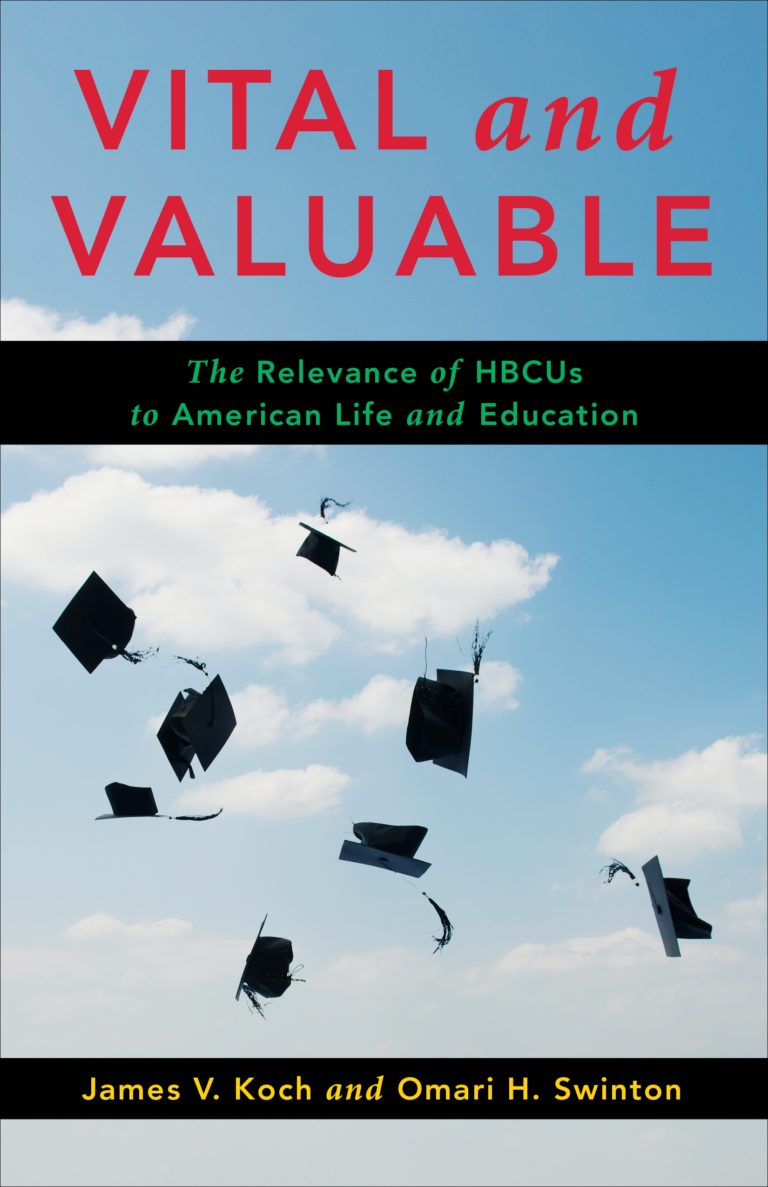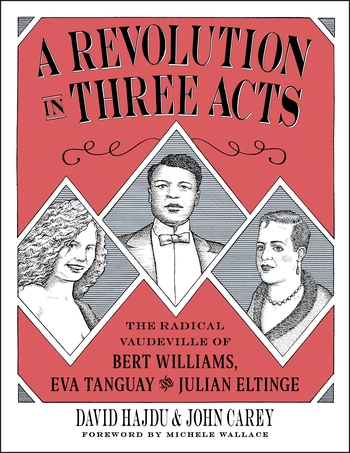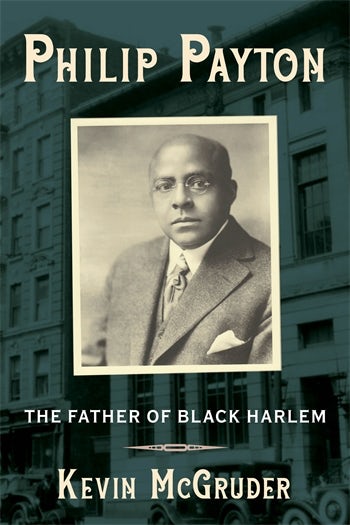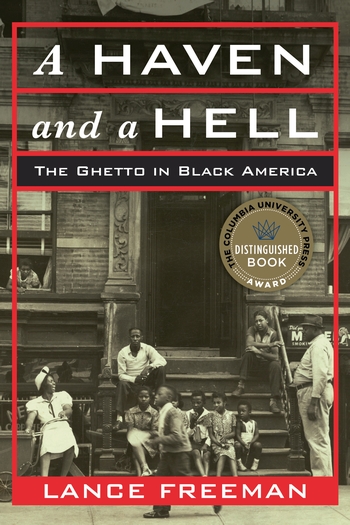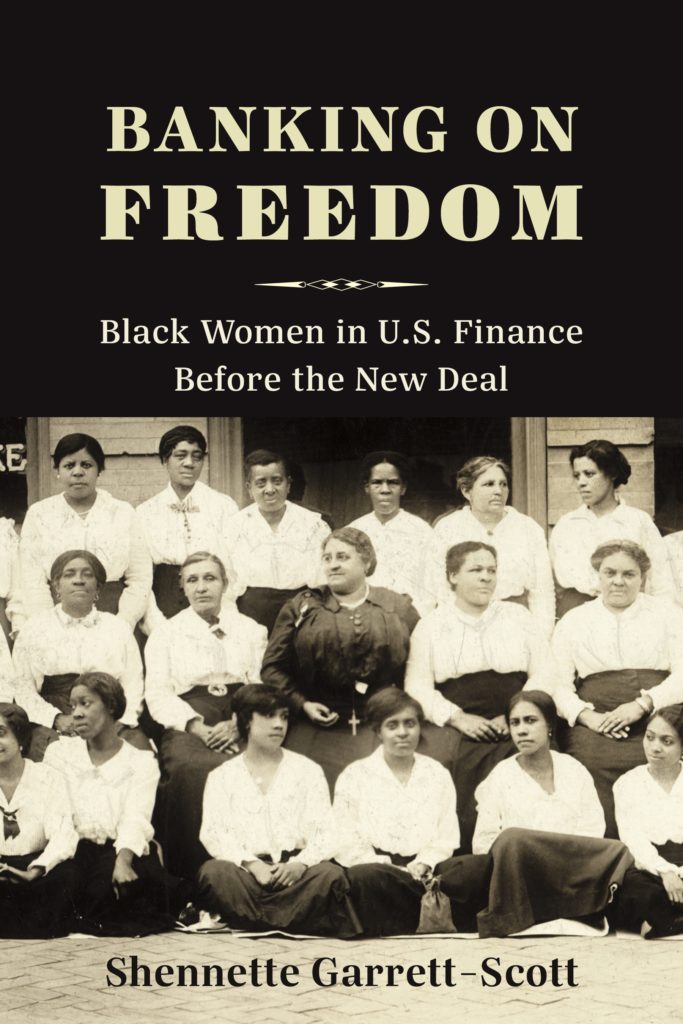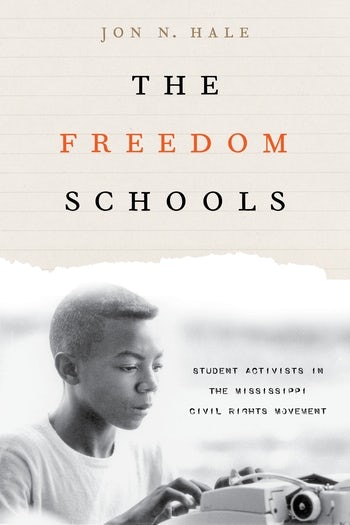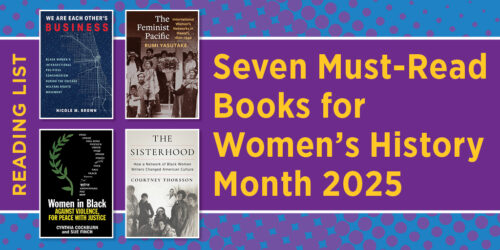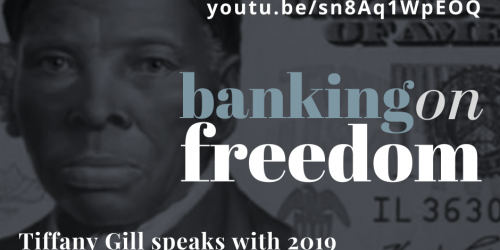Ten Must-Read Books for Juneteenth 2023
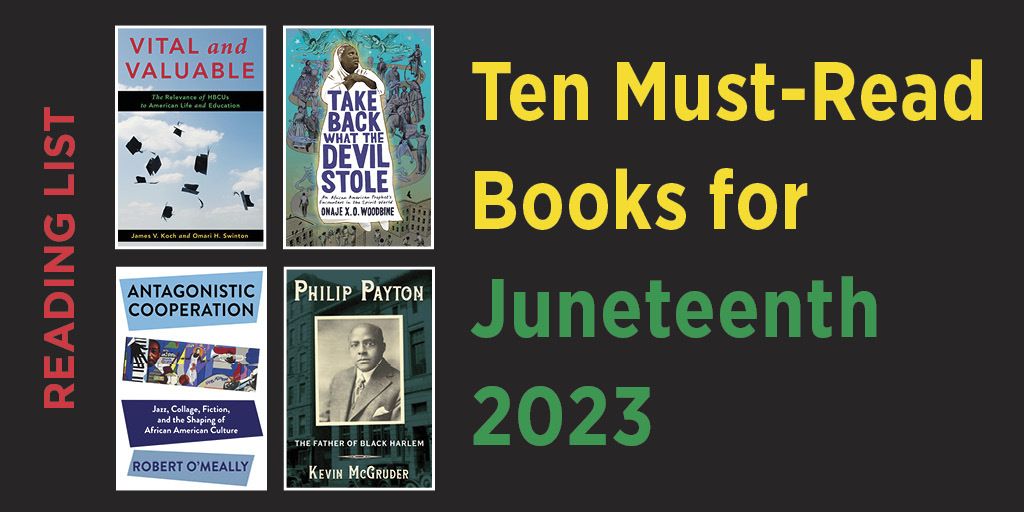
June 19th, or Juneteenth, commemorates the 1865 proclamation for the freedom of enslaved people in Texas, but it also has come to broadly celebrate Black American culture and the continuing fight by Black Americans for liberation and equality. The books on this list celebrate Black American culture—from jazz music to Afrofuturism—and reflect on the hardships and injustices faced by the Black community under a white supremacist system.
Vital and Valuable
The Relevance of HBCUs to American Life and Education
James V. Koch and Omari H. Swinton
Vital and Valuable emphasizes the importance of historically Black colleges and universities (HBCUs) while also taking a necessary look at the economic performance of such schools. Economists James V. Koch and Omari H. Swinton both contextualize these crucial institutions within the landscape of American higher education and shine a light on the factors that make these institutions so distinct and geared toward the needs of Black students. The two offer sound policy recommendations in order to allow HBCUs to continue, and improve upon, serving the needs 0f their students. Read about the six core questions essential to understanding the role and contributions of HBCUs today.
Take Back What the Devil Stole
An African American Prophet’s Encounters in the Spirit World
Onaje X. O. Woodbine
Onaje X. O. Woodbine’s exploration of the Black woman’s connections to spirituality and religion in Take Back What the Devil Stole creates a compelling and emotional narrative. Woodbine’s landscape, haunted by the abuse faced by generations of Black individuals, is confronted directly by a Black female prophet whose goal is to reclaim power from centuries of violence and injustice. Part fiction and part ethnographic account of Black spirituality, this book serves as a powerful testament to the struggle undertaken by Black women against oppression. Watch this video to hear more about the book’s protagonist, Ms. Donna Haskins.
Antagonistic Cooperation
Jazz, Collage, Fiction, and the Shaping of African American Culture
Robert G. O’Meally
Antagonistic Cooperation details the history of twentieth-century collaboration of different fields of African American art—jazz, collage, literature—working off one another to form contemporary Black culture. Robert G. O’Meally presents the idea that aspects of Black art, such as the improvisational nature of jazz and the separate images that make up a collage, are not representative of a brokenness or separateness but rather of a layered and complex existence that makes up Black identity. Through an exploration of Black artists in various disciplines—for example, Jean-Michel Basquiat, Toni Morrison, and Duke Ellington—O’Meally outlines how the overlap of different African-American artists’ work created a community that continues to provide hope. Read this interview with O’Meally about Antagonistic Cooperation.
A Revolution in Three Acts
The Radical Vaudeville of Bert Williams, Eva Tanguay, and Julian Eltinge
David Hajdu and John Carey
A Revolution in Three Acts tells the story of three provocative vaudeville performers—Bert Williams, Eva Tanguay, and Julian Eltinge—whose performances defied norms and rejected harmful traditions of the time. David Hajdu and John Carey demonstrate how individuals are able to shape a large audience’s point of view through the histories of the three entertainers. Although the stories are a century old, the struggles of these three performers bear a shocking resemblance to current challenges around race, sexuality, and gender. Listen to an interview with Hajdu and Carey about their book.
Philip Payton
The Father of Black Harlem
Kevin McGruder
Philip Payton delves into the life of a Black real estate entrepreneur credited with shaping Harlem into its present form. Payton, driven by his determination to combat housing discrimination, strategically established Harlem as a predominantly Black community, purging the neighborhood of individuals who were uncommitted to racial equality. Despite his efforts to safeguard the rights of Black people to reside in Harlem, Payton took advantage of the limited housing options available to them, charging higher rents. Payton discovered that constructing all-Black buildings rather than integrated ones could yield greater success, thereby deepening racial segregation within Manhattan. Kevin McGruder’s portrayal of Philip Payton is nuanced and intricate, examining both his achievements and the inherent limitations of pursuing equality within a capitalist system. Read an excerpt from Philip Payton.
A Haven and a Hell
The Ghetto in Black America
Lance Freeman
Both a place of community and a center of economic neglect, the Black American ghetto serves to simultaneously uplift and suppress. A Haven and a Hell examines the various forces that have historically caused the ghetto to take the role of either haven or hell, providing a crucial understanding of urban Black communities. With this history as a foundation, Lance Freeman offers planning and policy recommendations that focus on the needs of inner-city neighborhoods and promise a better future for Black Americans living in the ghetto. Watch this video of Lance Freeman discussing what makes Harlem special.
We Testify with Our Lives
How Religion Transformed Radical Thought from Black Power to Black Lives Matter
Terrence L. Johnson
In light of recent backlash against state-sanctioned violence—particularly police killings—against unarmed Black people, Black radicalism has returned to prevalence. In We Testify with Our Lives, Terrence L. Johnson argues that the roots of Black radicalism, from SNCC to the present, lie in religious ethics. Through the consideration of the works of thinkers like Audre Lorde, Toni Cade Bambara, Stokely Carmichael, Martin Luther King Jr., Malcolm X, and James Baldwin, Johnson calls for a new framework to achieve liberation from the oppressive forces of white supremacy and exploitation outside of the liberal imagination. We Testify with Our Lives presents a compelling argument by offering a fresh narrative on Black radicalism and, in so doing, uncovers novel perspectives on the role of Black Power in shaping discussions on ethics, democracy, politics, and freedom. Read the prologue of We Testify with Our Lives.
Black Utopia
The History of an Idea from Black Nationalism to Afrofuturism
Alex Zamalin
From under the oppressive force of white supremacy, Black utopian artists and thinkers create an alternative perspective on the possibilities of Blackness beyond the constraints of a white-centric society. Black Utopia explores these perspectives, examining a variety of Black artists and thinkers who dared to imagine ways of being, built on a radical departure from the near-dystopian reality of white supremacy. Alex Zamalin investigates the work of a variety of figures in both the Black nationalist and Afrofuturist movements, such as W. E. B. DuBois, Sun Ra, Octavia E. Butler, and Samuel R. Delany, among others, in order to drive his conclusion that utopianism is a powerful force in combating injustice. Take a look at this excerpt from Black Utopia.
Banking on Freedom
Black Women in U.S. Finance Before the New Deal
Shennette Garrett-Scott
Centering Black women’s engagement with banking, finance, and insurance, Banking on Freedom seeks to tell an untold history of Black female financial innovation and its impact on United States capitalism. Garrett-Scott explores this broader history through the history of the first and only bank run by Black women in the Jim Crow South: St. Luke Bank in Richmond, Virginia. The bank wrought both economic success and extralegal violence, as the women running the bank faced the consequences of living in a society that views Black economic emancipation as a threat to the racial capitalism on which the U.S. thrives. This book chronicles the fight undertaken by these women in order to meet the needs of working-class Black women, despite pressure to submit to a system working against them. Check out this video on ABWH-TV featuring Shennette Garret-Scott.
The Freedom Schools
Student Activists in the Mississippi Civil Rights Movement
Jon N. Hale
The Freedom Schools tells the story of the Mississippi Freedom Schools, created in 1964 as part of the Mississippi Freedom Summer, established in order to offer African American students an alternative education that encouraged student activism. Confronting impediments in the form of segregationist policies to educational prospects, the Freedom Schools provided Black youth with a strong education that also facilitated a type of learning not taught in traditional schools: learning to resist a violently unjust system. Jon N. Hale utilizes firsthand accounts from former Freedom School students and teachers to tell the exceptional history of a movement that, according to Hale, played a crucial role in the civil rights movement. Read this blog post to learn more about Hale’s perspective on the lasting impact of the Freedom Schools.
Categories:African American / Black StudiesBlack StudiesReading List
Tags:A Haven and a HellA Revolution in Three ActsAlex ZamalinAntagonistic CooperationBanking on FreedomBlack UtopiaDavid HajduJames V. KochJohn CareyJon N. HaleJuneteenthJuneteenth 2023Kevin McGruderLance FreemanOmari H. SwintonOnaje X. O. WoodbinePhilip PaytonRobert G. O’MeallyShennette Garrett-ScottTake Back What the Devil StoleTerrence L. JohnsonThe Freedom SchoolsVital and ValuableWe Testify with Our Lives

